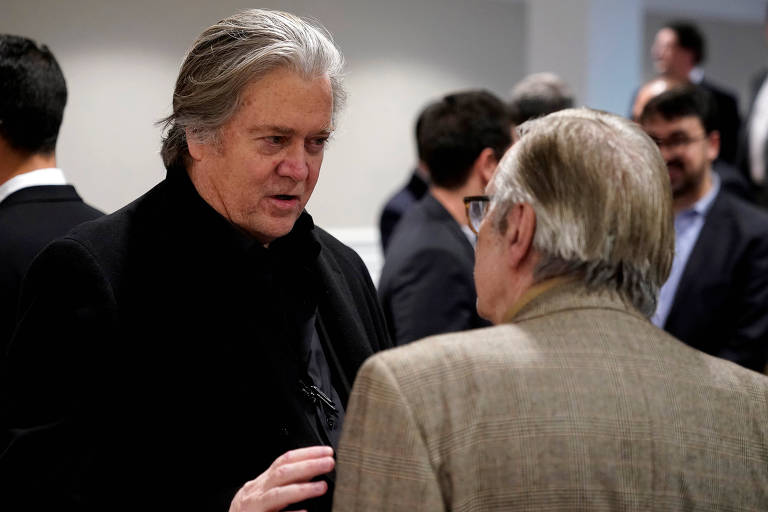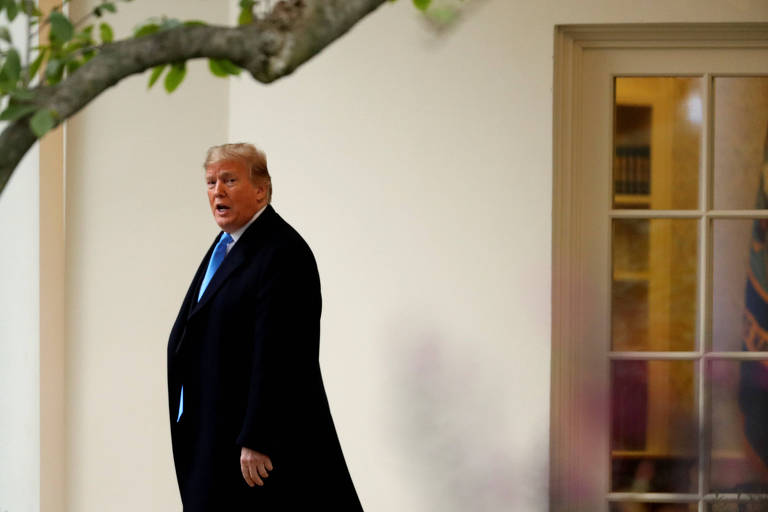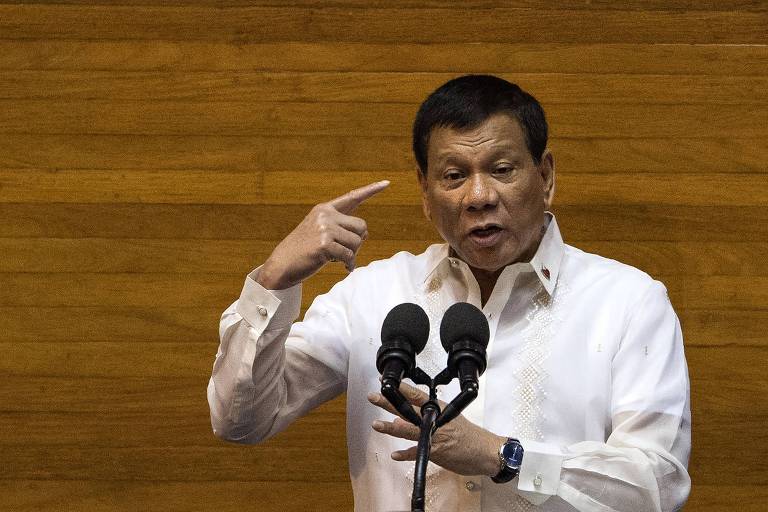SÃO PAULO
O que têm em comum o guru bolsonarista Olavo de Carvalho, o estrategista americano Steve Bannon e Alexandr Dugin, conselheiro do líder russo Vladimir Putin?
Todos eles seguem uma filosofia obscura chamada tradicionalismo, como conta Ben Teitelbaum, em seu livro recém-lançado “War for Eternity - Inside Bannon's Far-Right Circle of Global Power Brokers” (guerra pela eternidade - dentro do círculo dos poderosos de direita radical de Bannon, em tradução livre).
O tradicionalismo era, até pouco tempo atrás, uma franja pouco conhecida do conservadorismo. “É a primeira vez que tradicionalistas chegam tão perto do poder; apesar de não terem cargos formais, têm grande influência”, diz Teitelbaum à Folha.

O estrategista americano Steve Bannon conversa com o escritor brasileiro Olavo de Carvalho (de costas) durante encontro em Washington - Joshua Roberts - 16.mar.19/Reuters
“Olavo de Carvalho é um dos principais tradicionalistas globais”, diz o autor. Segundo ele, o tradicionalismo está na base da política de demonização da China e de aproximação com os EUA.
Os tradicionalistas acreditam que a religiosidade, a espiritualidade, deveria estar no centro da sociedade, em vez da democracia secular, da liberdade de expressão, da igualdade econômica.
Essa corrente de pensamento também se opõe à homogeneidade das sociedades de massa ou à busca por igualdade; eles são a favor de hierarquias. Ressaltam a necessidade de se voltar ao tempo anterior à modernidade, de buscar as religiões não corrompidas.
A influência dos tradicionalistas tem grande reflexo sobre a política externa, diz Teitelbaum, que é professor de relações internacionais da Universidade do Colorado (EUA) e estudioso da extrema direita.
Ele passou dois anos entrevistando expoentes dessa corrente de pensamento, entre eles Olavo, Bannon e Dugin, e acompanhou encontros entre o guru brasileiro e o estrategista americano.
Segundo Bannon e Olavo, a ala ideológica do governo brasileiro estava lutando para “livrar o Brasil de sua geopolítica mercantilista que amarra o país à China, em vez de priorizar as raízes espirituais que tornam o Brasil parte do Ocidente judaico-cristão”.
“A China representa tudo o que os tradicionalistas rejeitam –na visão deles, é uma sociedade massificada, materialista, científica, que desumaniza as pessoas e está focada em aspectos econômicos”, explica Teitelbaum.
Nesse tema, tradicionalistas como Olavo e Bannon convergem, ao encarar a China como a grande inimiga, enquanto Alexandr Dugin acha que os EUA é que representam a modernidade e, portanto, a maior ameaça.
O autor descreve uma reunião secreta que Bannon teve com Dugin em 2018, na Itália, em que tentou convencer o russo de que EUA e Rússia são aliados naturais, os dois compartilhando a herança judaico-cristã. Olavo já entrou em confronto com Dugin em uma discussão pela internet, defendendo que os EUA representam, sim, uma volta às raízes.
Dois dos principais pensadores tradicionalistas são o francês René Guénon (1886–1951), autor de “A Crise do Mundo Moderno”, e o italiano Julius Evola (1898-1974), que escreveu “Revolta Contra o Mundo Moderno”.
Para Guénon, o Renascimento foi um início da era das trevas, a ciência e a racionalidade são ilusões, e é preciso que a humanidade volte às verdades absolutas das religiões.
Os tradicionalistas não especificavam qual religião –Guénon, por exemplo, converteu-se ao islamismo.
Tradicionalistas valorizam o islamismo e o hinduísmo como religiões puras e não corrompidas pela modernidade. E muitos, como Olavo de Carvalho, são católicos.
O italiano Evola colaborou com o ditador fascista italiano Benito Mussolini e também tentou influenciar os nazistas.
Ele incorporava ao tradicionalismo a questão da raça e afirmava que os arianos eram superiores a semitas, africanos e todos os não arianos, assim como a masculinidade estava acima da feminilidade, e o norte, acima do sul global.

O presidente dos EUA, Donald Trump, é talvez o principal líder comparado a Jair Bolsonaro. Eleito em 2016 de forma surpreendente, o bilionário fez campanha prometendo "fazer a América grandiosa novamente". Desde que assumiu, afastou os EUA de acordos multilaterais e implementou uma política anti-imigração mais dura. Reuters/Cathal McNaughton

Rodrigo Duterte foi eleito presidente das Filipinas em 2016 com a promessa de acabar com a criminalidade do país em seis meses. Sua política de guerra às drogas é criticada por entidades de direitos humanos por fazer uso da violência policial e de grupos de extermínio. AFP/Noel Celis
Segundo Teitelbaum, “o movimento tradicionalista acabou gerando uma metástase, o fascismo italiano”.
“Alguns tradicionalistas são alinhados ao fascismo, outros rejeitam essa parte das ideias de René Guénon e Evola, mas de várias maneiras a extrema direita se associou a Evola”, diz.
O Jobbik, partido de direita radical da Hungria, também tem grande influência do tradicionalismo, de acordo com Teitelbaum.
“Ernesto Araújo [chanceler brasileiro] é mais tradicionalista até do que Olavo” e “discute as obras de Guénon e Evola fluentemente”, diz o professor no livro.
Ernesto cita Evola no texto “Trump e o Ocidente”, que ele escreveu em 2017 e foi um dos motivos pelo qual foi escolhido chanceler do governo Bolsonaro.
E no mais recente post em seu blog Metapolítica, Ernesto bebe em muitas das ideias do tradicionalismo, diz Teitelbaum, ao criticar o projeto globalista, a Organização Mundial da Saúde, a ideologia de gênero e o imigracionismo.
“Para os tradicionalistas, a era das trevas em que vivemos é o globalismo, em que a hierarquia é destruída e não há fronteiras nem limites –e a tradução máxima disso são as instituições que desafiam fronteiras, como ONU, União Europeia, OMS.”
Segundo Teitelbaum, Olavo não se descreve como um tradicionalista, pois rejeita rótulos.
“Mas, durante sua vida, ele mergulhou fundo na filosofia tradicionalista, leu todas as obras de René Guénon”, diz o estudioso.
E, nos anos 1980, Olavo fez parte de uma tariqa, uma comunidade sufista (uma corrente mística do islamismo), nos Estados Unidos, cujo líder era o suíço Frithjof Schuon, herdeiro intelectual de Guénon.
“[René Guénon] é um dos críticos mais eficientes da modernidade ocidental”, disse Olavo quando Teitelbaum o visitou em sua casa na Virgínia.
“Seria bom que o Brasil se aliasse aos EUA, mas isso não vai acontecer, porque todos os militares são a favor da China –eles amam a China e odeiam os EUA. E a maioria dos políticos também. Então o Brasil é um aliado da China, um instrumento da China”, disse ele, segundo o autor.
“A China é o maior perigo. Eles não têm uma noção real de humanidade. Eles acham que pessoas são coisas, que você pode substituir uma pessoa pela outra. Eles não são boas pessoas.”
Olavo estava otimista, no entanto, com a Europa. Segundo o livro, o guru bolsonarista disse ao autor que, na Hungria, na Polônia e na Romênia, as pessoas estavam “acordando para a base espiritual da civilização".
"Agora eles sabem que a sociedade não pode ser baseada em dinheiro, ciência e tecnologia. É absurdo. Se você não tiver contato com Deus, você está perdido.”


